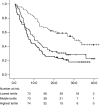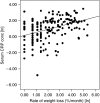The influence of systemic inflammation, dietary intake and stage of disease on rate of weight loss in patients with gastro-oesophageal cancer
- PMID: 19127266
- PMCID: PMC2634686
- DOI: 10.1038/sj.bjc.6604828
The influence of systemic inflammation, dietary intake and stage of disease on rate of weight loss in patients with gastro-oesophageal cancer
Abstract
Although weight loss is often a dominant symptom in patients with upper gastrointestinal malignancy, there is a lack of objective evidence describing changes in nutritional status and potential associations between weight loss, food intake, markers of systemic inflammation and stage of disease in such patients. Two hundred and twenty patients diagnosed with gastric/oesophageal cancer were studied. Patients underwent nutritional assessment consisting of calculation of body mass index, measurement of weight loss, dysphagia scoring and estimation of dietary intake. Serum acute-phase protein concentrations were determined by enzyme-linked immunosorbent assay. In all, 182 (83%) patients had lost weight at diagnosis (median loss, 7% body weight). Weight loss was associated with poor performance status, advanced disease stage, dysphagia, reduced dietary intake and elevated serum C-reactive protein (CRP) concentrations. Multiple regression identified dietary intake (estimate of effect, 38%), serum CRP concentrations (estimate of effect, 34%) and stage of disease (estimate of effect, 28%) as independent variables in determining degree of weight loss. Mechanisms other than reduced dietary intake or mechanical obstruction by the tumour appear to be involved in the nutritional decline in patients with gastro-oesophageal malignancy. Recognition that systemic inflammation plays a role in nutritional depletion may inform the development of appropriate therapeutic strategies to ameliorate weight loss, making patients more tolerant of cancer-modifying treatments such as chemotherapy.
Figures


References
-
- Alexandrakis MG, Passam FH, Ganotakis ES, Sfiridaki K, Xilouri I, Perisinakis K (2003) The clinical and prognostic significance of erythrocyte sedimentation rate, serum inteleukin-6 and acute phase protein levels in multiple myeloma. Clin Lab Haematol 25(1): 41–46 - PubMed
-
- Argiles JM, Alvarez B, Lopez-Soriano FJ (1997) The metabolic basis of cancer cachexia. Med Res Rev 17(5): 477–498 - PubMed
-
- Baracos V, Rodemann HP, Dinarello CA, Goldberg AL (2003) Stimulation of muscle protein degradation and prostaglandin E2 release by leukocytic pyrogen (interleukin-1). A mechanism for the increased degradation of muscle proteins during fever. N Engl J Med 308(10): 553–558 - PubMed
-
- Barber MD, Fearon KCH, McMillan DC, Slater C, Ross JA, Preston T (2000) Liver export protein synthetic rates are increased by oral meal feeding in weight-losing cancer patients. Am J Physiol Endocrinol Metab 279(3): E707–E714 - PubMed
Publication types
MeSH terms
Substances
LinkOut - more resources
Full Text Sources
Medical
Research Materials
Miscellaneous

